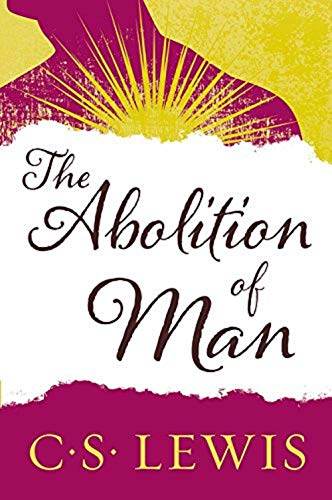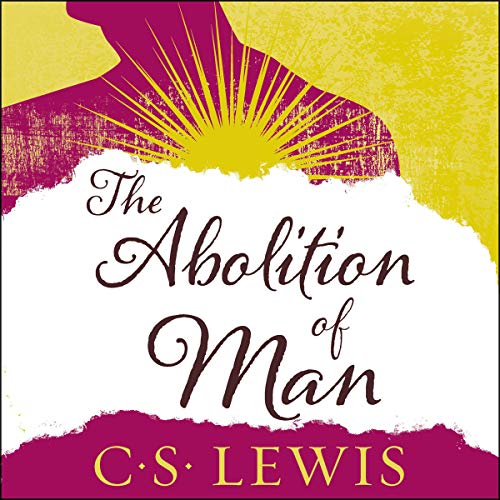-
The Abolition of Man
C. S. Lewis
Paperback (HarperOne, April 7, 2015)In the classic The Abolition of Man, C.S. Lewis, the most important Christian writer of the 20th century, sets out to persuade his audience of the importance and relevance of universal values such as courage and honor in contemporary society. Both astonishing and prophetic, The Abolition of Man is one of the most debated of Lewis’s extraordinary works. National Review chose it as number seven on their "100 Best Nonfiction Books of the Twentieth Century."
-
The Abolition of Man
C. S. Lewis, Douglas Gresham, HarperAudio
Audible Audiobook (HarperAudio, May 13, 2014)Both astonishing and prophetic, The Abolition of Man remains one of C. S. Lewis's most controversial works. Lewis sets out to persuade his audience of the ongoing importance and relevance of universal objective values, such as courage and honor, and the foundational necessity of natural law. He also makes a cogent case that a retreat from these pillars of our educational system, even if in the name of "scientism", would be catastrophic. National Review lists it as number seven on their "100 Best Nonfiction Books of the 20th Century".
-
The Abolition of Man
C. S. Lewis
eBookC.S. Lewis's The Abolition of Man purports to be a book specifically about public education, but its central concerns are broadly political, religious, and philosophical. In the best of the book's three essays, "Men Without Chests," Lewis trains his laser-sharp wit on a mid- century English high school text, considering the ramifications of teaching British students to believe in idle relativism, and to reject "the doctrine of objective value, the belief that certain attitudes are really true, and others really false, to the kind of thing the universe is and the kinds of things we are." Lewis calls this doctrine the "Tao," and he spends much of the book explaining why society needs a sense of objective values. The Abolition of Man speaks with astonishing freshness to contemporary debates about morality; and even if Lewis seems a bit too cranky and privileged for his arguments to be swallowed whole, at least his articulation of values seems less ego-driven, and therefore is more useful, than that of current writers such as Bill Bennett and James Dobson. --Michael Joseph Gross
-
Abolition of Man
C. S. Lewis
Hardcover (Lits, Dec. 23, 2010)None
-
The Abolition of Man
C. S. Lewis
Mass Market Paperback (Macmillan, March 15, 1967)VERY GOOD VINTAGE PAPERBACK, CLEAN AND TIGHT BOOK. SHIPS FROM WA- USPS. EXPEDITED SHIPPING AVAILABLE. The Macmillan company, 1965. The Abolition of Man; or, Reflections on education with special reference to the teaching of English in the upper forms of schools. Bibliographical foot-notes.Education; English language; General; Non-Fiction; Philosophy; Study and teaching (Secondary)
-
The Abolition of Man or Reflections on Education with special Reference to the Teaching of English in the Upper Forms of School
Lewis C S
Hardcover (Macmillan, March 15, 1947)Hardcover book
-
The Abolition of Man: Or Reflections on Education With Special Reference to the Teaching of English in the Upper Forms of Schools
C. S. Lewis
Paperback (Touchstone Books, June 1, 1996)The author of The Problem of Pain and many other works contemplates how education develops humankind's sense of morality and influences one's later life. Reprint. 20,000 first printing.
-
C. S. Lewis'sThe Abolition of Man
C. S. Lewis (Author)
Hardcover (Lits, March 15, 2010)None
-
The Abolition of Man
C. S. Lewis
Paperback (Macmillan Pub Co, March 15, 1978)The Abolition of Man is a 1943 book by C. S. Lewis. It is subtitled "Reflections on education with special reference to the teaching of English in the upper forms of schools," and uses that as a starting point for a defense of objective value and natural law, and a warning of the consequences of doing away with or "debunking" those things. It defends science as something worth pursuing but criticizes using it to debunk values - the value of science itself being among them - or defining it to exclude such values. W
W
-
The Abolition of Man
C. S. Lewis
Paperback (B & H Pub Group, April 1, 2000)C. S. Lewis sets out to persuade his audience of the importance and relevance of universal values such as courage and honor in contemporary society.
-
The Abolition of Man
C. S. Lewis
Mass Market Paperback (Macmillan, March 15, 1977)MacMillan paperback, showing ancient statue on front in profile, black paper wraps, gold and red writing, some tanning to outside edges.
-
The Abolition of Man
C. S. Lewis
Paperback (HarperOne, March 20, 2001)C. S. Lewis sets out to persuade his audience of the importance and relevance of universal values such as courage and honor in contemporary society.